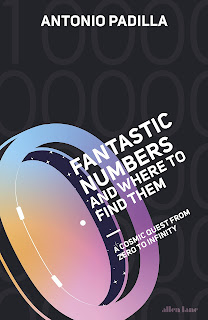Once we get into the chapters proper, though, it does settle down a bit and Padilla gives us a whole range of mathematical insights to physical theories. We start with time dilation and relativity more generally before leaping to supermassive black holes. From here the dance of ideas continues - googols and googolplexes bring up the possibility of cosmic doppelgängers, while we then jump again to thermodynamics (with no numbers for quite a long time until statistical mechanics brings those big numbers back). Of course the next leap to quantum physics gives us whole new reasons to think in terms of big numbers... and so it goes.
A section on small numbers is mostly concerned with particle physics (with a lot on the Higgs boson) before we finally plunge into infinity. Here we get a nice gallop through the history of infinity - mostly mathematical without much physical context (perhaps surprisingly the role of infinity in calculus, so central to physics, hardly gets a mention). Things get interesting when we get to the problems of infinity for QED and how they were dealt with, finishing with a paean to string theory.
One problem I had with all of this is there's a kind of forced quirkiness throughout that never quite works - from the title's play on the Harry Potter spinoff title to, for example, the idea of using the number 1.000000000000000858 as a 'big number' because this is the time dilation factor that Usain Bolt would have undergone when racing in 2009, which feels arbitrary to the point of... pointlessness. I also really disliked the way that Padilla treats speculative theories such as what he refers to in the introduction as 'the holographic truth' (what's usually called the holographic principle), something that is largely self-referential maths driven by the increasingly doubted string theory and that has no current way of being tested. He later rather fudges the answer as to whether or not the holographic principle is real, but unconvincingly calls it 'the most important idea to have emerged in physics in the last 30 years.'
I didn't dislike this book, and there were indubitably some interesting bits and pieces in it, but it was all far too Tiggerish for me.
Review by Brian Clegg - See all of Brian's online articles or subscribe to a weekly digest for free here




Comments
Post a Comment